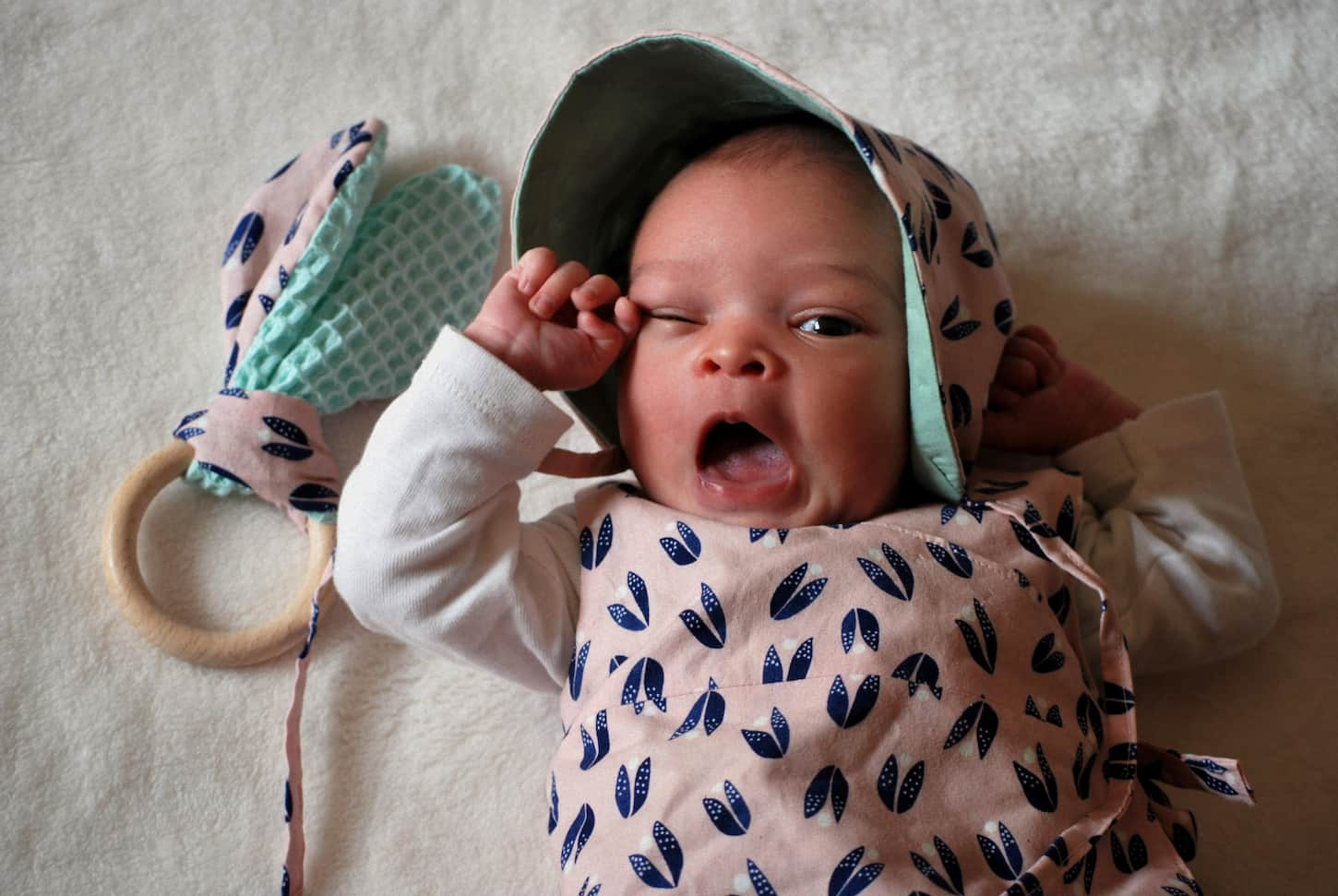One day as I was chatting with other parents about sleep training, one mom asked me what the ideal baby wake times are by age. And because I didn’t have that committed to memory, I decided to do some research for an even more thorough answer. Starting with this: what are baby wake times?
Most babies, starting at about 2-3 months of age, can have their full day’s schedules regulated by using average baby wake times on the “eat, wake, sleep cycle.” These timing guidelines can help guide the timing of naps, bedtime, meals, playtime, and more – making sure that your baby gets adequate sleep while growing.
- For the first 2-3 months after birth, a wake-sleep cycle goes from 2 hours to 3 hours – with the wake times gradually increasing from “just long enough to feed” at birth to an hour or 90 minutes at 3 months old.
- By six months, those times are still slowly expanding so that a full cycle is about 4-5 hours and awake times are 2.5-3 hours in length.
- This trend continues until about 12 months old – when kids are ready to be awake for up to 5 hours at a go! Well, as long as they then get a good nap, that is.
Let’s break it down further.

What is Baby Wake Time?
Baby wake times are based on the “Eat, Wake, Sleep” cycle that many sleep training programs and doctors (including ours) promote. It uses sleep signs and cues (here’s my article explaining what those are – along with the most common signs to watch for) along with age and developmental averages to set an ideal full day’s schedule – including a sleep, wake, eats, and play schedule for children.
As such, these timelines are great guidelines that may need to be customized or adjusted for individual needs.
My babies needed a slight adjustment to the usual pattern. They instead preferred to “Wake, Play, Eat, Sleep.” It worked better with their preferred eating pattern and their mild reflux, too. This way they could be upright after eating as part of reflux management.
The main benefit to the Eat, Wake Sleep cycle is, of course, that it’s easier to prevent the sleep crutch of nursing to sleep. So if you can use that schedule, it’s definitely better.
However, if you’ve got stubborn babies (like this ginger does) know that it’s okay to customize things to work for you. Your baby will adjust and things will still work out – most probably when they wean! And for more help with sleep training and weaning, read my full article on it here.
So a cycle refers to the whole thing – eating, playing, and sleeping. But depending on your baby’s age, the exact baby wake time windows and schedule will be slightly different.
Here are children’s average sleep requirements (by age) from birth to about 18 years of age. Don’t worry – we’ll still go deep into detail on each category further in this article. This table is mostly just a starting reference point for everything.
| Age | Number of Naps | Average Nap Length | Wake Time Between Naps | Bedtime | Nighttime Sleep Requirements | Sleep Needed in 24 Hours |
|---|---|---|---|---|---|---|
| Birth to 6 weeks | 4 to 8 | 15 minutes to 4 hours | 45 minutes to an hour | Between 9 and 11 PM | 8 to 14 hours | 14 to 18 hours |
| 6 weeks to 3 months | 3 to 4 | 30 minutes to 2 hours | 1 to 2 hours | Between 8 and 11 PM | 8 to 13 hours | 11 to 15 hours |
| 3-6 months | 3 | 1 to 2 hours | about 2 hours | 8 to 10 PM | 9 to 12 hours | 12 to 16 hours |
| 6-9 months | 3 | 1 to 2 hours | 2 to 3 hours | 8 to 10 PM | 9 to 12 hours | 12 to 14 hours |
| 12-18 months | 1 to 2 | 1 to 2 hours | 3 hours | 7 to 8 PM | 10 to 12 hours | 12 to 14 hours |
| 18 months to 3 years | 1 | 1 to 2 hours | N/A | 7 to 8 PM | 10 to 12 hours | 11 to 14 hours |
| Preschoolers | 0 | N/A | N/A | 7 to 8 PM | 10 to 13 hours | 10 to 13 hours |
| Grade schoolers | 0 | N/A | N/A | 7 to 8 PM | 9 to 12 hours | 9 to 12 hours |
| Teenagers | 0 | N/A | N/A | 8 to 10 hours | 8 to 10 hours |
An important note: this whole baby wake times timeline is generally structured on a normal, on-time delivery. If your baby was born a few weeks early, then you may need to use their adjusted date (most commonly based on their due date) rather than the actual birthdate. If your child has growth or other developmental delays, you may also need to use their adjusted age instead of their actual age.
Ready to look at it by age? Let’s do this.

Awake Time Cycles by Age: birth to 1 year
Because babies grow an awful lot during the first year, let’s break things down into several sections. And, one final reminder that you may need to use your baby’s adjusted age instead of their actual, especially if they were born prematurely.
Newborn Wake Times (first two weeks)
With newborns, most of their “play” time is going to be used to do their favorite activity: EATING. And if they’re super talented like my munchkins, they might practice eating (suckling) while they sleep, too.
In any case, newborns don’t do much other than eat, sleep, and pee/poop. That’s totally normal. Use that awake time to feed them so that they get the sleep they need to keep growing.
Here’s the cycle breakdown, based on averages:
- Total cycle length: 2-3 hours
- Newborn awake time: just long enough to eat
- Number of naps needed: too many to bother counting
- Recommended bedtime: 9:30 PM
- Daily Sleep Requirements: 16-20 hours
- Notes: Some newborns do need to be woken up to feed. Others don’t. This will depend on age, development, and tons of other factors. Watch how your baby is growing and remember to consult with your pediatrician for specifics.
Newborn Awake Times (next 3-6 weeks)
By a few weeks old, most babies start to do some fun things – like looking around for a bit before wanting to nurse (or feed) and zonk back out for nap #2815 for the day. Okay, fine – it’ll just feel like nap #2815 for the day. Really, most newborns take an average of anywhere from 3-8 naps per day.
It’s super tempting to keep a baby up to “play” at this age, but… don’t do it. They still need crazy amounts of sleep, so many parents report better outcomes when they stick to the schedule.
- Total cycle length: 2.5-3 hours
- Newborn awake time: long enough to eat with some playtime (30-60 minutes)
- Number of naps needed: still too many to bother counting
- Recommended bedtime: 9:30 PM
- Daily Sleep Requirements: 16-20 hours
- Notes: Some newborns at this age may still need to be woken up to feed. Others don’t. This will depend on age, development, and tons of other factors. Watch how your baby is growing and remember to consult with your pediatrician for specifics.
Infant Wake Times (2-3 months old)
If your baby’s like mine, they’re going to be ready for more playtime at this age! And one of the best types of play that they need – but don’t want – is tummy time.
Guess what? Tummy time is so much fun!
No Parent Ever, at least not at first
They’ll learn to like it, though. At least, mine did after a while – and they learned to hold their heads up. Other great play ideas at this age are swing time, going on walks in strollers, and looking around at cool things, like mobiles.
- Total cycle length: 2.5-3 hours
- Awake time: 1-1.5 hours
- Number of naps needed: too many to bother counting
- Recommended bedtime: 8-9 PM
- Daily Sleep Requirements: 15-18 hours
- Notes: Swaddling our kids was still on our radar at this age.
Baby Awake Cycle (4-5 months old)
Okay, so 2 hours doesn’t sound like a long time to be awake, but for a 4-5-month-old? It’s an eternity. They can play a lot more fun stuff, though, so have fun watching them watch their environment, learn to roll over (it’s terrifying at first!), and more.
Just remember that all of this stimulation is exhausting! So if your baby needs some quieter play to keep from catching a second wind (or becoming overstimulated) that would mess with sleep times, do it.
Sometime in here, your baby’s naps will consolidate, too. So watch for that.
- Total cycle length: 3-4 hours
- Awake time: 2 hours
- Number of naps needed: 3
- Recommended bedtime: 7-8 PM
- Daily Sleep Requirements: 14-16 hours
- Notes: Somewhere in here, our babies began to escape swaddling – so we transitioned them out of it. Especially once they learned to roll over! This transition is NOT easy. At least, it wasn’t for us – it took a week or two to normalize things.
Baby Wake Time (6 months)
Wake up and playtime gets extended! Woo hoo! For us, this is when having a baby became so much more fun, just based on how much more interactive things get. So much more playing, too!
If your baby’s like mine, some days will be 2 nap days and others will be 3 nap days – at least until they’re adjusted to the 2 nap days. Just know it’s not one-and-done graduation to 2 naps – seriously. I wish someone had told me that because it would have saved me so much stress!
- Total cycle length: 4-4.5 hours
- Waketime: 2-3 hours
- Number of naps needed: 2-3
- Recommended bedtime: 7-8 PM
- Daily Sleep Requirements: 14-15 hours
- Notes: Binky tethers are totally an amazing thing. Baby still can’t quite manage it on their own, but they’re catching on.
Baby Schedule (7-9 months)
Our kids became a lot more mobile at this stage – lots more sitting, crawling attempts, and trying to eat all the things.
This is when we transitioned our kids into their own cribs.
- Total cycle length: 4.5-5 hours
- Awake time: 2.5-3.5
- Number of naps needed: 2
- Recommended bedtime: 7-8 PM
- Daily Sleep Requirements: 14-15 hours
- Notes: This is when we had to implement our first real sleep training plan with our kids – at least, this is when it actually worked.
Baby’s Wake Time Schedule (10-12 months)
Somewhere in here, depending on your child, they’re going to want to graduate to one nap. But, just like when things went from 3 naps to 2, it’s going to take some time. Remember to alternate days – do some with 2. Then do a couple with just 1 nap. Do it every other day if you need to!
Even so, this age is fun. Especially because this is when our kids were finally sleeping all night (okay, so they were down to waking 1-2 times to nurse really quickly, but that was it!).
- Total cycle length: 4.5-5 hours
- Awake time: 3-5.5
- Number of naps needed: 1-2
- Recommended bedtime: 7-8 PM
- Daily Sleep Requirements: 12-14 hours
- Notes: Our babies were late teethers, so this is when they finally got teeth! When the baby’s teething, expect a few rough nights until the teeth erupt. Then, things should settle down – at least until the next tooth comes in!

Awake Time Cycles by Age: from 1-3 years of age
After one, I noticed that the awake time cycles had mostly gone away. Instead, they were replaced by a more set schedule – one that we set.
Here’s the schedule we set:
- 7 AM: wake up, eat breakfast, and go play.
- 10:30 AM: give in to cute kids begging for snacks.
- 11:30 AM: lunchtime!
- 12:30 PM: nap time for the toddler
- 3 PM: wake up, eat a snack, and get back to playing with the siblings
- 5:30 PM: dinner time
- 6:30 PM: bedtime ritual begins, with lights out at 7 PM
And by this age, my kids were able to go with it.
But… let’s keep the trend going with a list to make things easy, shall we?
- Total cycle length: set schedule
- Waketime: by schedule
- Number of naps needed: 1-2
- Recommended bedtime: 7-8 PM
- Daily Sleep Requirements: 11-13 hours
- Notes: Every kid is different! Some kids nap until they’re 5 or 8 – others are done before 2. It’s going to depend on your family’s needs, scheduling, and other factors.
You’ll notice something… They are more focused on bedtimes for one majorly important reason: kids all stop napping at different ages.
By about 15 months of age, my oldest boy stopped napping. You can go ahead and feel sad for me, it’s okay. Spoiler: I survived. And my other children napped somewhat better – but even my youngest stopped napping just after she turned 2.
Now, that’s not a common thing, but it does happen. So if you’re in the same boat as we’ve been, focus on early bedtimes. In fact, even as he was transitioning out of naps we often had to shift to focusing on bedtimes in order to ensure he got enough sleep. We’ve found that those early bedtimes have been the key to managing napless children and sleep regressions.
Here is the article I wrote on how early bedtimes are the key to managing those sleep regressions – it may very well help you out if naps are an issue for you, too!
In any case, helping your children get enough sleep should help you stay sane – and help you get enough sleep, too. Because it makes parenting a lot more fun when we all get the sleep we need to function.
How Do You Know if You’re Keeping Baby Awake too Long?
The best way to know that your baby has been awake too long is their behavior. Ask yourself these questions:
- Are they acting tired?
- Are they less interested in their surroundings, environment, and people?
- How easily are they falling asleep for naps or bedtime?
- Have they started waking up more easily during naps or after falling asleep?
If you answered yes to any of these (or your baby is having trouble falling asleep), then your baby is probably staying awake too long during an awake window.
So, let’s fix that.
How to Adjust Wake Windows for Overtired Babies
If your baby is acting tired, interacting less, or sleep has become an issue, then your baby is probably staying awake too long. Try shortening the awake timeline – and making the transition to naps (or bedtime) more soothing.
Then, see how the next awake period goes. If your baby acts happier, more interested, and slept better, then you’re on the right track. Keep adjusting things until you find the right balance for your child.
If a shorter awake period doesn’t fix things, try several shorter awake periods in a row – and maybe even try an earlier bedtime. In most cases, that should remedy the situation. In other situations, you may need several days’ worth of shorter awake times to see improvement.
In the event that shorter awake times do not fix things, please make an appointment with your pediatrician to rule out any medical concerns. And then talk to them about your baby’s sleep concerns, too.

Related Questions
How long should a newborn stay awake? A newborn may stay awake for as long as 2-3 hours. This window will involve interacting, watching, eating, and required diaper changes. Newborns should not be kept awake but allowed to sleep on demand.
How long should a newborn sleep without feeding? Most newborns may need to eat every 2-3 hours, depending on whether they’re drinking breastmilk or formula. As long as a baby is growing well and properly hydrated, they may be allowed to sleep longer. Be sure to consult your pediatrician.
How long should a 2-4-month-old sleep at night? Babies from 2-4 months of age may need anywhere from 8-13 total hours of sleep at night. Babies may not sleep that whole time, as they may require several feedings within that timeframe.